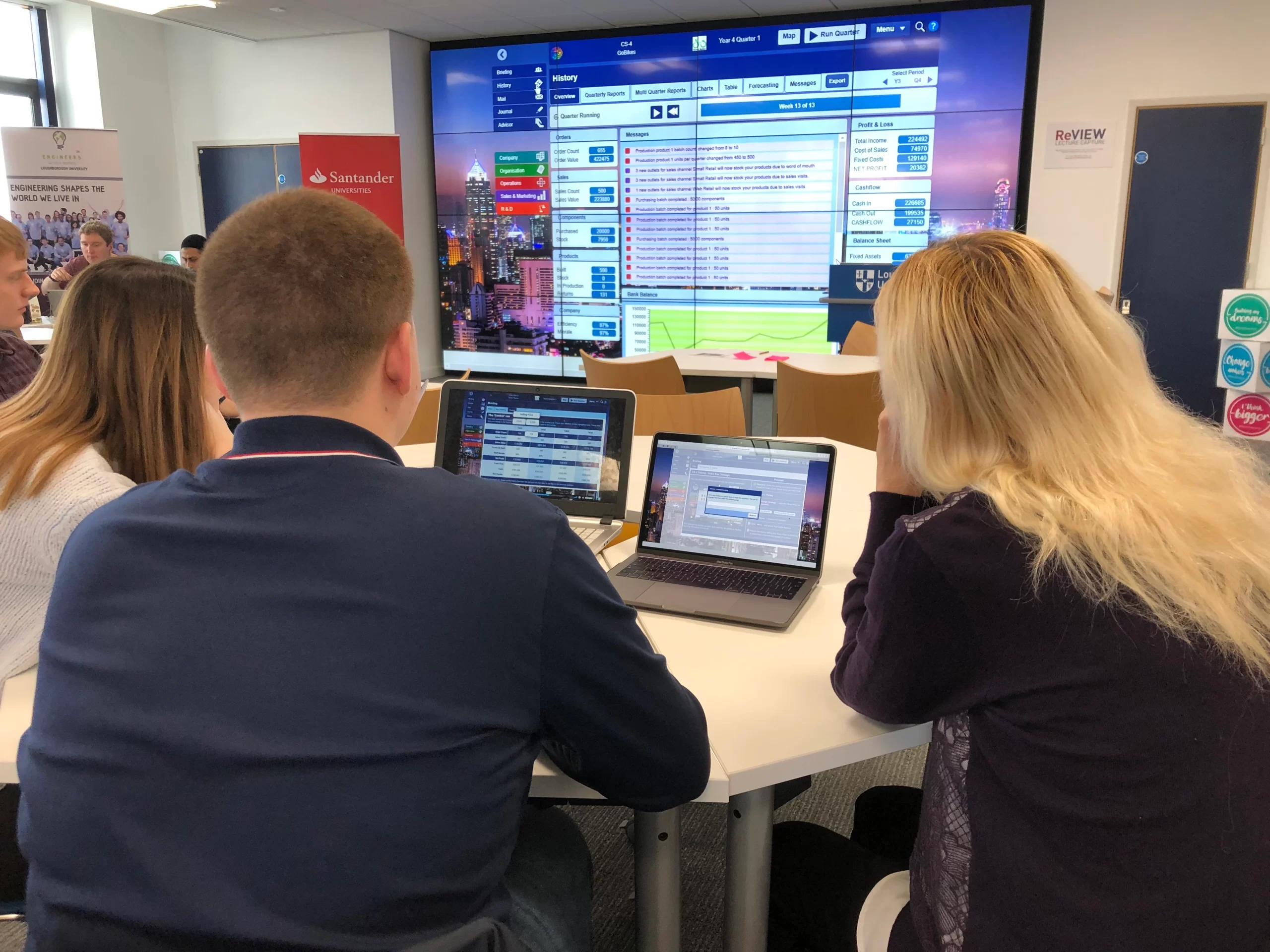What is a business simulation game?

A business simulation game is a learning tool that you can use for education or leisure. They allow people to run a virtual company and learn by making decisions, analysing results and dealing with consequences.
Modern business games trace back to board and war games in China. Modern business simulation games first appeared in 1955 when the Rand Corporation developed an exercise focusing on U.S. Air Force logistics.
Simulations have been proven valuable in industries such as healthcare and aviation. As a result, the popularity of business simulation games has grown.
What are the benefits of business simulation games?
Business simulation games allow people to learn by doing. Unlike a textbook, a simulation engages and empowers people to make their own business decisions and manage the consequences.
A well-designed, authentic business simulation game helps learners develop enterprise skills, including:
- Teamwork
- Communication
- Problem solving
- Leadership
- Negotiation
For educators and trainers, simulations help demonstrate business theory working in practice by allowing learners to experience key concepts first-hand.
As for students, simulations are a fun and engaging way to learn key business concepts. Business simulations also resonate with learners who don’t typically respond to traditional teaching methods. As a result, many academics and instructors report higher levels of student engagement and learner satisfaction.
Online business simulations also offer greater flexibility to both students and trainers. Since they are accessible online, you can be access them remotely at any time and from any location. Of course, users can also play in person in a classroom or computer lab.

Who uses business simulation games?
Business simulations are used by a variety of organisations and individuals including:
- Schools
- Higher and further education institutions
- Corporate firms
- Business coaches
- Independent learners
Several basic ‘Monopoly-style’ business sims exist as apps which are aimed at the consumer gaming market. In comparison, serious business simulations are more complex and are often used on a pc. They also offer greater depth and supporting resources making them a popular choice in education and training.
More employers are finding that graduate and MBA hires have acquired knowledge and experience using a business simulator. Organisations are also increasingly turning to effective online learning to save money, time, and reduce their carbon footprint.
The greatest use of business simulation games is in higher education. Although traditional ‘sage on the sage’ approaches have prevented greater growth.
However, COVID-19 and the move to mass online learning has catalysed a change in academic thinking. The use of business simulation software is set to grow considerably.
How are simulation games used?
Universities and colleges use simulators in class and on distance learning modules. A high quality simulation lets learners collaborate from different locations. They also allow instructors and trainers to communicate with and assess people remotely.
In comparison, corporate organisations often use business simulators to support recruitment activity, train new staff members, and support employee development programs.
Educators and trainers recognise that business simulation software can develop a range of business skills for learners. Quality resources also foster the development of soft skills and support students to build business acumen.

How our digital learning software can help you
If you are looking for a high quality online business game that engages learners authentically, consider the our high quality online business game, Evolution.
Evolution allows people to run a bicycle manufacturing company for up to 10 simulated years (up to 40 turns). Students can use the simulation individually or in groups to start, manage, or scale their virtual business. Educators have control over the variety of challenges that students can be set. Participants can also work remotely from any location.
In comparison, Classic is our original offline business simulation. Users can start and manage a small computer company for up to three simulated years (36 turns). Classic was the first business simulation we released and is a multi-award winning platform.
How much do business games and simulations cost?
Business simulation game licenses can cost as little as £20 + VAT. You can request a price estimate of our simulations here.
Generous volume discounts are available especially on site licenses, and technical and training support always accompanies purchase. For peace of mind, trainers and tutors can book a free online demo and get to trial the simulation before making any buying decisions.
Liked this blog post? You may enjoy these articles too.
-
Evolution’s new guided activities for learners
You may have noticed new activities appearing on your Evolution Control Tower recently. What are these activities, and how can they help learners develop business skills?These activities give educators a structured way to guide learners through the simulation while building core business knowledge.Here’s a quick overview of what to expect from Evolution’s new activities: Business…
-
Global Student Teams Shine in Evolve! 2025 Business Simulation Competition
We’re thrilled to announce the winners of Evolve! 2025, SimVenture’s premier international business simulation competition, proudly sponsored by Genio. This year’s event set a new benchmark, with 257 students across 73 teams from 13 countries testing their strategic thinking and entrepreneurial skills in a dynamic, team-based challenge. Celebrating the top teamsAfter four days of intense…
-
Transforming business education in schools with SimVenture
Find out more about our work in schools and how Evolution, our online business simulation, is making a difference.




